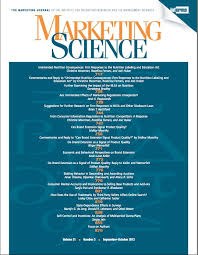
Daljord, Ø., Mela, C., Roos, J., Sprigg, J. and Yao, S. (2023). The Design and Targeting of Compliance Promotions Marketing Science, 42(5):866--891.
-
Affiliated author
-
Publication year2023
-
JournalMarketing Science
This paper considers an experiment-based approach to the optimal design and targeting of compliance promotions. Compliance promotions involve optional participation on the behalf of customers. For example, physicians must consent to see detailers, and consumers must redeem coupons to obtain discounts. Individual compliance decisions affect the mix of customers participating in the promotion and, therefore, how the promotion affects sales. Optional compliance is an especially acute problem in the context of field experiments as policy optimization often necessitates extrapolation beyond the observed cells of the experiment to a different mix of complying customers. Our approach to optimizing the design and targeting of compliance promotions involves (i) an experiment to exogenously vary promotion features; (ii) a means to identify which promotion features can be causally extrapolated; (iii) an approach to extrapolate those causal effects; and (iv) an optimization over the promotion features, conditioned on the extrapolation. The approach is easy to estimate, accommodates two-sided noncompliance due to unobserved heterogeneity, and establishes partial identification bounds of causal effects. When applying the approach to a hotel loyalty promotion, wherein customers must visit enough hotels to earn bonus loyalty points, we find profits are improved considerably.